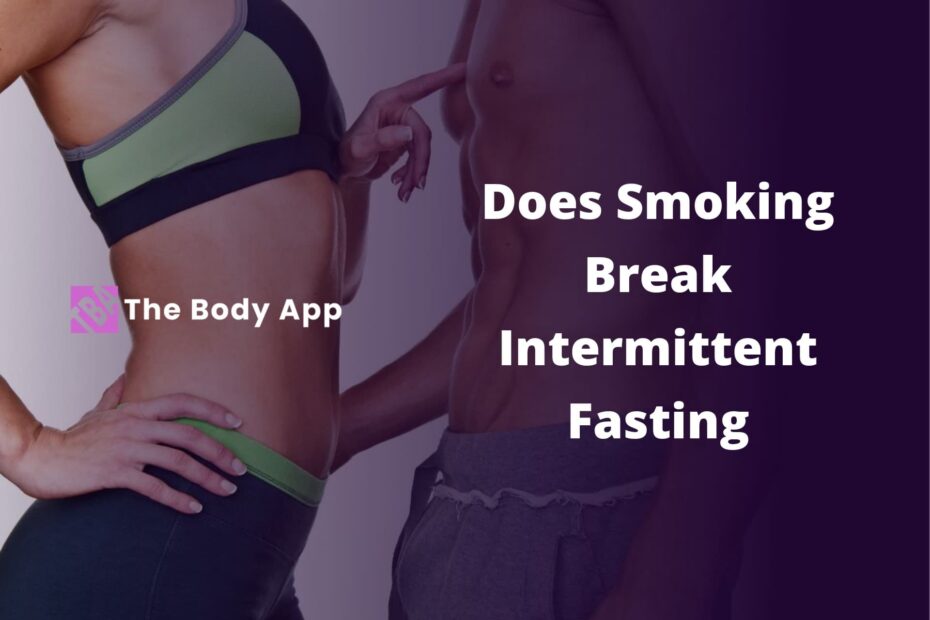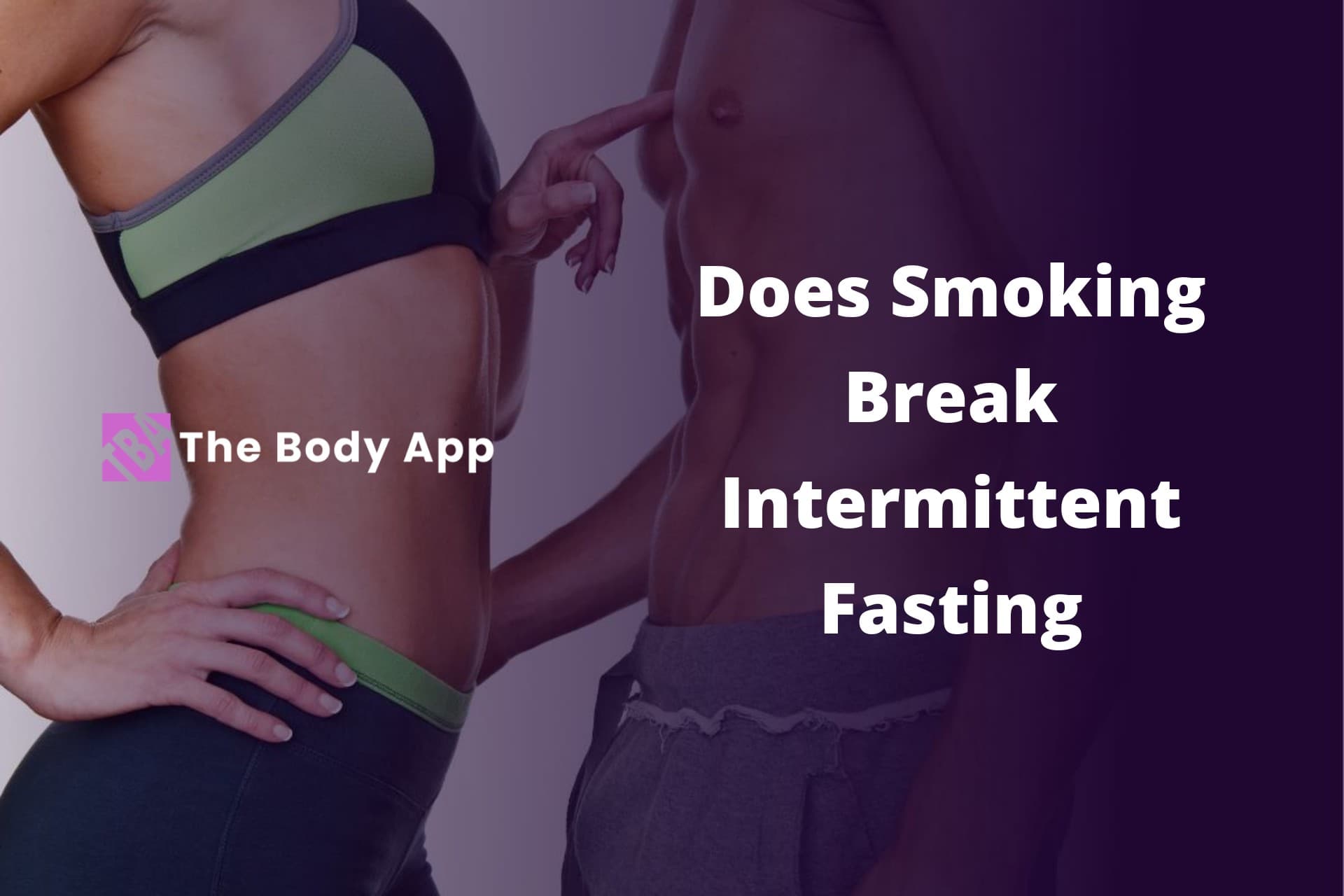Do you ever wonder if smoking breaks your intermittent fasting? It’s a question that many people have asked, and today we’re here to provide you with evidence-based information on the topic.
In this article, we will explore the effects of smoking on intermittent fasting and uncover the potential disruptions it may cause to the benefits of fasting. By understanding this relationship, you can make informed decisions about combining intermittent fasting and smoking cessation strategies.
Let’s dive in and discover the truth behind this theory.
The Effects of Smoking on Intermittent Fasting
Smoking can have negative effects on your intermittent fasting journey, so it’s best to avoid it during your fasting periods. Not only does smoking pose significant health risks, but it can also interfere with the benefits you are trying to achieve through intermittent fasting.
Firstly, let’s discuss the health risks of smoking. Smoking is a leading cause of preventable diseases such as lung cancer, heart disease, and chronic obstructive pulmonary disease (COPD). The harmful chemicals present in cigarettes can damage your lungs and cardiovascular system, reducing their efficiency and increasing the risk of developing these conditions. By continuing to smoke while practicing intermittent fasting, you may be undermining the positive impact that fasting can have on improving your overall health.
Moreover, quitting smoking is crucial for both your general well-being and successful intermittent fasting. There are various smoking cessation techniques available that can help you overcome nicotine addiction and improve your chances of staying smoke-free. These techniques include behavioral therapy, nicotine replacement therapy (such as patches or gum), and prescription medications.
Understanding the Impact of Smoking on Fasting Benefits
Smoking can have significant effects on your metabolic processes, potentially impacting the way your body utilizes energy and nutrients. Research suggests that smoking may lead to increased insulin resistance and a decrease in insulin sensitivity, which can disrupt normal metabolic functioning.
Additionally, when you quit smoking and experience nicotine withdrawal, it can further affect your metabolism by causing changes in appetite, cravings, and energy expenditure.
Understanding these effects is crucial for anyone looking to make informed decisions about their health and well-being.
Smoking and Metabolic Processes
When you smoke, it can have an impact on your body’s metabolic processes. Here are some ways smoking affects weight loss and insulin sensitivity:
- Impaired nutrient absorption: Smoking damages the lining of your digestive system, making it harder for your body to absorb essential nutrients. This can hinder weight loss efforts by reducing nutrient availability.
- Increased appetite: Nicotine in cigarettes acts as an appetite suppressant, leading to decreased food intake. However, when you quit smoking, your appetite may increase, potentially causing weight gain.
- Elevated insulin resistance: Smoking is associated with increased insulin resistance, making it more difficult for your cells to respond to insulin properly. This can lead to higher blood sugar levels and a greater risk of developing type 2 diabetes.
- Impaired fat metabolism: Smoking has been shown to interfere with the breakdown and metabolism of fats in the body. This disruption can affect weight management and contribute to unhealthy fat accumulation.
Overall, smoking negatively impacts both weight loss efforts and insulin sensitivity, highlighting the importance of quitting for overall health improvement.
Effects of Nicotine Withdrawal
After quitting smoking, you may experience nicotine withdrawal symptoms such as irritability and cravings. Nicotine is a highly addictive substance found in cigarettes that affects the brain’s reward system. When you stop smoking, your body goes through a period of adjustment as it adapts to the absence of nicotine.
This can lead to various withdrawal symptoms, including mood swings, anxiety, difficulty concentrating, and intense cravings for cigarettes. Managing these symptoms during fasting requires a combination of strategies.
Firstly, it is important to recognize that cravings are temporary and will eventually pass. Distracting yourself with activities or engaging in relaxation techniques can help alleviate the intensity of cravings.
Additionally, staying hydrated and maintaining a balanced diet can also contribute to managing cravings effectively during fasting periods.
How Smoking Affects the Body’s Response to Intermittent Fasting
While intermittent fasting, it’s important to consider how smoking affects your body’s response. Smoking can have various impacts on hunger suppression and insulin levels, which are both key factors in the success of intermittent fasting.
Here are four ways smoking can affect your body’s response to intermittent fasting:
- Increased hunger: Contrary to popular belief, smoking actually increases appetite rather than suppressing it. Nicotine stimulates the release of certain hormones that can make you feel hungrier during the fasting period.
- Disrupted insulin levels: Smoking interferes with insulin sensitivity, making it harder for your body to regulate blood sugar levels effectively. This can lead to fluctuations in energy levels and make it more challenging for your body to switch between burning glucose and fat during fasting periods.
- Reduced benefits: Smoking negatively impacts overall health and well-being, counteracting some of the positive effects of intermittent fasting such as improved metabolic function and weight loss.
- Increased health risks: Combining smoking with intermittent fasting may increase the risk of developing serious health conditions like cardiovascular disease and diabetes due to their combined negative effects on hormonal balance and inflammation.
Considering these potential drawbacks, quitting smoking would be beneficial for those practicing intermittent fasting as it would improve hunger regulation, stabilize insulin levels, enhance overall health outcomes, and reduce associated health risks.
Exploring the Relationship Between Smoking and Fasting Results
When it comes to fasting, smoking can have a significant impact on your overall results.
Not only does smoking break the fast by introducing harmful toxins into your body, but it can also increase nicotine cravings during fasting periods.
Additionally, the long-term effects of smoking can further hinder your progress and potentially lead to serious health issues.
Smoking’s Impact on Fasting
You should be aware that smoking can potentially disrupt your fasting experience. While fasting itself has numerous health benefits, combining it with smoking may have negative implications on your overall well-being. Here are some reasons why you should consider quitting smoking before or during your fasting period:
- Nicotine addiction: Smoking during fasting can worsen nicotine cravings and make it harder to resist the urge to smoke, leading to potential relapse.
- Increased appetite: Smoking is known to suppress appetite, so when you quit smoking during a fast, you may experience an increase in hunger and cravings for unhealthy foods.
- Negative impact on metabolism: Smoking can affect your metabolic rate, making it more difficult for your body to burn fat efficiently during a fast.
- Health risks: Combining smoking with fasting may increase the risk of various health issues such as respiratory problems and cardiovascular diseases.
In order to optimize your fasting experience and improve your overall health, consider implementing smoking cessation strategies and seeking support from healthcare professionals or support groups specialized in nicotine addiction and fasting.
Nicotine Cravings During Fasting
Nicotine cravings can intensify during a fast, potentially leading to relapse for individuals who are trying to quit smoking. When you’re fasting, your body is already under stress from not consuming food, and this can trigger stronger cravings for nicotine. Research suggests that nicotine replacement therapy (NRT) can be helpful in minimizing these cravings during fasting periods. NRT provides controlled doses of nicotine without the harmful chemicals found in cigarettes, helping to satisfy the craving while reducing withdrawal symptoms. By using NRT products such as patches, gums, or lozenges, you can effectively manage your nicotine cravings and increase your chances of successfully quitting smoking. Remember that quitting smoking is a journey and it’s important to seek support from healthcare professionals or support groups along the way.
| Nicotine Replacement Therapy (NRT) | |
|---|---|
| 1 | Helps minimize cravings |
| 2 | Provides controlled doses of nicotine |
| 3 | Reduces withdrawal symptoms |
| 4 | Increases chances of quitting successfully |
Long-Term Effects of Smoking?
If you’re a long-term smoker, quitting now can significantly improve your overall health and reduce your risk of developing serious diseases. Here are some long-term health risks associated with smoking and effective smoking cessation methods:
- Increased risk of lung cancer: Smoking is the leading cause of lung cancer, accounting for approximately 85% of all cases.
- Heart disease: Smoking damages blood vessels, increases blood pressure, and contributes to the development of heart disease.
- Respiratory conditions: Long-term smokers are more likely to develop chronic bronchitis, emphysema, and other respiratory illnesses.
- Reduced immune function: Smoking weakens the immune system, making it harder for the body to fight off infections and diseases.
To quit smoking, consider using evidence-based methods such as nicotine replacement therapy (NRT), medication like bupropion or varenicline, counseling support groups, or behavioral therapies.
Remember that quitting smoking is one of the best things you can do for your long-term health.
Smoking and Its Potential Disruption of Intermittent Fasting Benefits
Smoking can potentially disrupt the benefits of intermittent fasting. While intermittent fasting has been shown to have numerous health benefits, such as weight loss and improved insulin sensitivity, smoking can counteract these positive effects and pose additional health risks.
When you smoke while practicing intermittent fasting, it not only introduces harmful substances into your body but also affects your metabolism and overall well-being. Cigarette smoke contains toxins that can impair the cellular processes involved in intermittent fasting, such as autophagy – the process by which damaged cells are removed and replaced with new ones.
Furthermore, smoking is known to increase oxidative stress and inflammation in the body. This can interfere with the metabolic changes induced by intermittent fasting and reduce its effectiveness in promoting weight loss and improving overall health.
To illustrate the potential risks of smoking during intermittent fasting, consider the table below:
| Potential Risks of Smoking During Intermittent Fasting | ||
|---|---|---|
| Increased oxidative stress | Impaired autophagy | Reduced insulin sensitivity |
| Inflammation | Slower metabolism |
If you are a smoker looking to enjoy the full benefits of intermittent fasting, it is important to consider smoking cessation techniques to quit this habit. By quitting smoking, you can minimize potential health risks associated with both smoking and interrupted intermittent fasting.
Strategies for Combining Intermittent Fasting and Smoking Cessation
Combining intermittent fasting with smoking cessation can be challenging, but there are strategies that can help you successfully quit smoking while still reaping the benefits of intermittent fasting. Here are some helpful strategies to consider:
- Use nicotine replacement therapy: Nicotine replacement products such as patches, gum, or lozenges can help manage cravings and reduce withdrawal symptoms during your fasting period.
- Establish a support system: Reach out to friends, family, or support groups who understand your goals and can provide encouragement and accountability throughout the quitting process.
- Find alternative coping mechanisms: Smoking often serves as a way to cope with stress or emotions. Identify healthy alternatives like exercise, deep breathing exercises, or engaging in hobbies to distract yourself from cravings.
- Modify your eating patterns: Plan your meals carefully during your eating window to ensure you have satisfying and nutritious options available. This can prevent hunger-induced cravings for cigarettes.
It’s important to note that smoking has negative effects on overall health and may impact the success of your fasting journey. Quitting smoking not only improves lung function but also reduces the risk of various diseases associated with both smoking and unhealthy lifestyle habits.
Conclusion
In conclusion, if you’re considering combining smoking and intermittent fasting, it’s crucial to understand the potential negative impacts.
Smoking can disrupt the body’s response to fasting, hindering the benefits that come with it.
Picture this: as smoke fills your lungs, it hinders your body’s ability to fully embrace the fasting process, like a dark cloud blocking out the sun.
To truly reap the rewards of intermittent fasting, it may be wise to consider quitting smoking altogether.
Remember, evidence-based strategies for combining intermittent fasting and smoking cessation are available to support your journey towards better health.

